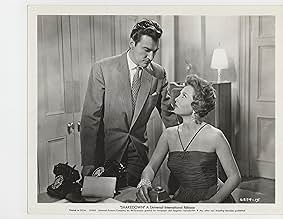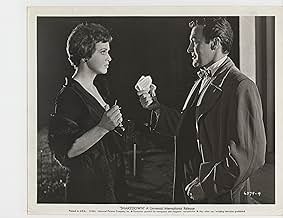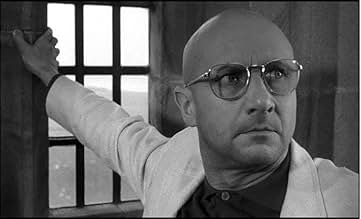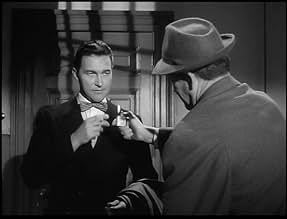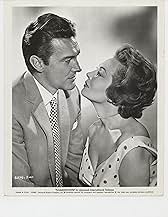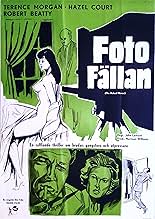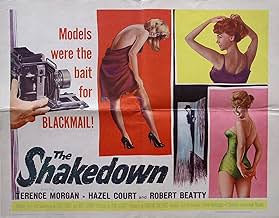A former pimp, released from prison, disregards his ex-cellmate's advice and reverts to criminal activities, this time involving a photographic model racket.A former pimp, released from prison, disregards his ex-cellmate's advice and reverts to criminal activities, this time involving a photographic model racket.A former pimp, released from prison, disregards his ex-cellmate's advice and reverts to criminal activities, this time involving a photographic model racket.
Larry Taylor
- 2nd Thug
- (as Laurence Taylor)
Featured reviews
Fascinating & slightly risqué B-pic with a good edge to it,Augie Cortona(Terrace Morgan) is release from prison & sets about reclaiming his underworld business from his former henchmen & colleague Gollar(Harry H Corbett) who's taken control of his protection & prostitution racket & left Augie out in the cold until he bumps into out of work photographer Jessup Brown(Donald Pleasance).The two of them Set up in business as a high class agency which is a front for Augie's blackmailing activities in which Jessup get caught up in the corruption which leads him to drink,one is not what she appears to be & Augie soon becomes attractive to her & along with Augie's sidekick Spettigue, Gollar is sorted out with beatings being dispatched & life's fine for Augie. With nightclubs & small racketeers the police are hot on his heels, this film hit the spot well,with pretty Hazel Court.
This film should be studied by all who seek info on a type of film popular for a while in 50's and 60's Britain. Although obviously of limited budget, it fielded an unusually fine cast including several stalwarts and many actors and actresses - Hazel Court, Donald Pleasance, Harry H Corbett who went on to greater things and starred the extremely underrated Terence Morgan,three years before he became known as TV's "Sir Francis Drake". The film is also something of an historical document, bringing back a time when nightclubs were uncommon, close and intimate and hoping to cater for a select clientelle instead of loud and bleary as they are now. The plot has holes in it but the acting is of a high standard which more than redeems the film.
Terence Morgan is released from prison. He can't go back to running street walkers; that racket has been taken over by another hood. He meets up with down-on-his-luck photographer Donald Pleasence and decides on a new racket, which he finishes by hitting the guy who took over his racket. On the surface, it's a fashion photography studio run by Pleasence, with a modeling agency and school; the real money is from letting people take 'art studies' of nude women.... and blackmailing them. It's nice while it lasts, but how long before the cops and underworld take notice?
Morgan is pretty good as the tough man with a few soft spots, including Pleasance and modeling student Hazel Court. It's an interesting mix of crime and character study. Philip Green's jazz score Is pretty good, but it becomes repetitious, particularly when it's woven into a nightclub score.
Morgan is pretty good as the tough man with a few soft spots, including Pleasance and modeling student Hazel Court. It's an interesting mix of crime and character study. Philip Green's jazz score Is pretty good, but it becomes repetitious, particularly when it's woven into a nightclub score.
So far nobody has commented on the truly hilarious title song which is sung in a club scene and over the credits at the end.Films of that era used to like to have a title song as a tie in.The lyrics of this are brief but memorable.The poor songwriter could only come up with "slakedown" and "askdown" as rhymes for shakedown.it has to be heard to be believed.The film itself is a very enjoyable example of a British 1950s gangster film.Mind you poor old Harry H Corbett doesn't look as if he could kill Sooty let alone Terence Morgan.His accent varies tremendously starting off as mid Atlantic.Donald Pleasance gives an inspired performance as a seedy photographer.However as to the blackmail racket,would it have been possible to blackmail someone for taking photos of a nude model.After all married men went to the still open Windmill Theatre and nobody blackmailed them.A bit quaint really,however a very entertaining film nonetheless.Plaudits to distributor Renknown for such a fine print.
"The Shakedown" (1960) is an excellent British crime drama starring Terence Morgan, Hazel Court, Donald Pleasence, Bill Owen, Robert Beatty, Harry H. Corbett, Gene Anderson, and many other fine lesser Brit character actors of the day, including Jackie Collins, Georgina Cookson, and Eddie Byrne. Loaded with talent, this well written and tautly directed show (less well-edited) reminds us that the Brits at the turn of the 60s were turning out well-crafted crime dramas for the masses that have stood the test of time very well. Now, there are a couple of idiosyncratic things about this one. First of all, the sort of jazzy, nearly rock'n'roll underlying score is very 50s - very. It's not bad at all, just a tad loud in a few places. Secondly, the title becomes a song in the middle of the proceedings. The singer is excellent - truly excellent; even the music is decent. But the song: the rhyming that goes on with "shakedown" is out and out ludicrous! Everything from slakedown and takedown to...you get the drift. It wouldn't have been so bad if only a rhyme or two was used, but this one was written by poet whose automatic writing was based on communication with a rhyming dictionary on Mars, and the rhyme with "shakedown" went on and on and on, and the rhymes began to be laughable. What was amazing was that the song was well done by the singer and the tune was done very seriously. Other than the song and the fact that the film should have been edited down from the 92 minutes to about 80, this was really good.
Morgan gets out of prison from a prostitution racket charge which he's served three years for, and now he gets into a blackmail racket, and also plans to get revenge on the man who took over his old racket. The blackmail racket is done by using a modeling front, a semi-legitimate one, combined with a professional photographer's studio, getting males to come in and have them caught with semi-nude and nude models in their photographs. Then the photos are used as bait for cash. This leads to some very interesting plot points, including a fine ending - which - you'll have to watch to find out what it is...
Did you know
- TriviaJackie Collins was so tired of being referred to as "Joan Collins sister" that she used the name "Lynn Curtis" for this movie.
- ConnectionsReferenced in Piccadilly Third Stop (1960)
Details
- Release date
- Country of origin
- Language
- Also known as
- Der nackte Spiegel
- Filming locations
- Alliance Film Studios, St Margarets, Twickenham, Middlesex, England, UK(studio: made at Twickenham Studios, London, England.)
- Production companies
- See more company credits at IMDbPro
- Runtime
- 1h 32m(92 min)
- Color
Contribute to this page
Suggest an edit or add missing content

